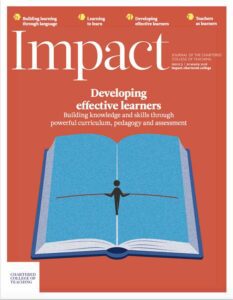Knowing your subject: The role of disciplinary knowledge in effective teaching

Changing perspectives
When I began teaching, back in 2003, I was frequently told that I was a teacher first and subject specialist second. There was a prevalent idea that we should be teaching generic transferable skills, such as evaluation or interpretation, and that our subjects were just a vehicle through which this was delivered. This was reflected in a national curriculum that was light on specific content and remote from developments at the ‘frontiers of the subject’ ((Marsden, 1997), p. 241). (For more on the place of facts, knowledge and skills within the curriculum, see (Christodoulou, 2014)).
More recently, however, there has been a growing recognition that a teacher’s subject knowledge is vitally important. In a review of research behind effective teaching, Coe et al. ((Coe et al., 2014), p. 2) found that a teacher’s subject knowledge, and their understanding of how pupils handle this subject, has strong evidence of impact on student outcomes.
We can see this need for excellent subject knowledge in Rosenshine’s Principles of Instruction (Rosenshine, 2012). Like Coe’s work, this looked at the defining characteristics of effective teaching and found, among other things, that effective teachers were able to provide detailed explanations of the material they were teaching. He writes that:
‘In a study of mathematics instruction, for instance, the most effective mathematics teachers spent about 23 minutes of a 40-minute period in lecture, demonstration, questioning and working examples. In contrast the least effective teachers spent only 11 minutes presenting new material.’ (p. 14)
Rather than overwhelming students by presenting too much new information at once, effective teachers checked students’ understanding along the way. Some taught by giving a series of short presentations using many examples, providing elaboration that proved useful for processing new material. We can’t lecture, demonstrate, question and provide worked examples unless our knowledge is sufficient for us to do so.
How can we maintain and improve our subject knowledge?
In many subjects, we need to ensure that our knowledge is broad as well as deep. Pupils learn best when they are provided with a wide variety of examples to illustrate an abstract concept (Willingham, 2009). In geography, I might want pupils to understand the idea of appropriate technology. To achieve this, I need to draw on a wealth of examples from my own subject knowledge: tractors in North Africa, the Play Pump scheme in South Africa or sanitation projects in rural India.
If we accept that subject knowledge is important to successful teaching, what can we do to improve the knowledge we have?
One strategy is just to prepare very well for each lesson. In his recollections of the effective teachers he encountered, both in his own school days and, later, working in education, Fergal Roche, chair of a sevenschool MATMulti-academy trust - a group of schools working in collaboration, governed by a single set of members and directors in Surrey and CEO of school leader and governor network The Key, notes how teachers used to turn up to class with notes to use in their teaching (Roche, 2018). This is something that seems to have fallen out of fashion but that I have found useful in teaching new topics for A-level.
The problem with this approach is that it can lead to teachers staying just one page ahead in the textbook, whereas lessons for many subjects rarely work this way when synoptic links to other parts of the subject are common. In the example above, about teaching appropriate technology, I would need not only knowledge of this concept and examples like the Play Pump scheme, but also knowledge of aquifers and different forms of aid. This kind of knowledge is more likely to accrue through a more regular immersion in your subject. One simple way to do this is to continue to read about your subject.
However, the content in academic journals and books can feel very far removed from the subject at school level. The information needs to be recontextualised from an academic setting to a school one (Firth, 2018). While research suggests that continuing professional development (CPD) programmes that consider both subject knowledge and subject-specific pedagogy can support teachers with developing subject expertise (Cordingley et al., 2015), I have had no real school CPD input on subject knowledge in 14 years of teaching, because there are few agencies that can deliver it. This is where subject associations can play a pivotal role. Most have regular publications, with articles not only on teaching the subject but on improving the teacher’s knowledge of the subject as well. For example, The Geographical Association have recently published articles on the changing ideas about tectonic movement and the implications for the classroom. Subject associations also offer training sessions and conferences, and there are an increasing number of subject-specific TeachMeetAn organised but informal event to bring teachers together and share practice events being organised by teachers around the country.
Social media has certainly made developing subject knowledge easier than ever, with communities of teachers willing to share resources and discuss teaching difficult concepts. Most subjects have their own hashtags on Twitter, such as #TeamEnglish and #GeographyTeacher, and many have their own dedicated group chat sessions (for example, see (Kaiser, 2018)).
Conclusion
A teacher’s subject knowledge is incredibly important. There are many things we can do to develop this subject knowledge ourselves and with the help of our colleagues, including:
1. Plan in time to develop your subject knowledge in the same way you would set aside time for marking or developing resources. Don’t feel guilty about this time – the research shows that little else will improve your teaching as much.
2. Join a subject association and make the most of their resources and training opportunities. Many departments have a group membership but they are often underused.
3. Look for a wider community of teachers on social media, at conferences and at TeachMeets and join in. Ask lots of questions and share your own ideas.
References
This article was published in February 2018 and reflects the terminology and understanding of research and evidence in use at the time. Some terms and conclusions may no longer align with current standards. We encourage readers to approach the content with an understanding of this context.










